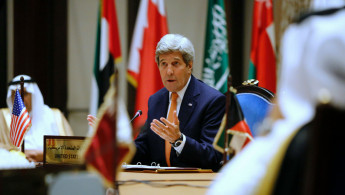'Human rights essential,' Kerry tells Bahrain
US Secretary of State John Kerry told Bahraini officials that respect for human rights was "essential", as the Gulf kingdom continues to face accusations of discrimination against its Shia-majority population.
"Here, as in all nations, we believe that respect for human rights and an inclusive political system are essential," Kerry told a joint press conference during his visit to Manama on Thursday.
Kerry said he and his Bahraini counterpart Sheikh Khalid bin Ahmed al-Khalifa "had the chance to discuss the ongoing effort to address and to reduce sectarian divisions here in Bahrain and elsewhere".
"I appreciate the seriousness with which he considers this issue," he said.
"We all welcome steps by sides to create conditions to provide for greater political involvement for the citizens of this great country," he added.
International human rights organisations have persistently accused the tiny but strategic Gulf state of clamping down on activists calling for a full constitutional monarchy with an elected prime minister in the kingdom.
| | |
| Video: Kerry's first official visit to Bahrain as Secretary of State |
The demands began with a Shia-led uprising, sparked amid the region-wide Arab Spring - in which dozens of Shias were arrested, killed or imprisoned for lengthy periods by Manama.
Most recently, the daughter of prominent rights activist Abdulhadi al-Khawaja was re-arrested, along with her one-year-old baby - despite being having served time in prison for tearing up a poster of King Hamad.
Khawaja's father, Abdulhadi, is serving a life sentence following his human rights activism during the 2011 pro-democracy protests in Bahrain.
"This is a humanitarian issue and Zainab al-Khawaja will be released pending her case in the court," Sheikh Khalid responded to a question on the fate of the young activist.
"She is in jail and she chose to keep her child with her.
"But of course she will be sent to her home," he said, without specifying when, adding that "the case will continue."
Earlier this month, Amnesty urged Bahraini authorities to "immediately and unconditionally" release jailed opposition figures.
"The alarming erosion of human rights in Bahrain in recent years means that anyone who dares to criticise the authorities or call for reform risks severe punishment," said Amnesty's regional deputy director James Lynch.
Five years after Bahrain's revolution, demonstrators still take to the streets and clash with police in Shia towns surrounding Manama, but are met with a heavy-handed government response.





 Follow the Middle East's top stories in English at The New Arab on Google News
Follow the Middle East's top stories in English at The New Arab on Google News

![Israeli forces ordered bombed Gaza's Jabalia, ordering residents to leave [Getty]](/sites/default/files/styles/image_330x185/public/2176418030.jpeg?h=a5f2f23a&itok=_YGZaP1z)
